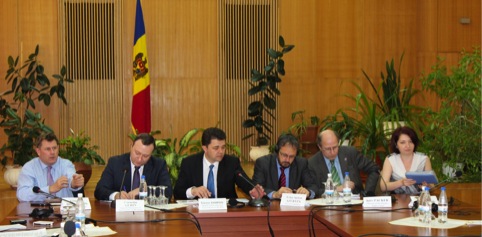“Transitional justice requires deft leadership” – A workshop on criminal indictment in the context of conflict settlement in Chisinau
In support of the Transdniestrian conflict settlement process, Crisis Management Initiative (CMI), in cooperation with Causeway Institute, organised a closed-door workshop and a public conference on Criminal Indictments in the Context of Conflict Settlement.

The events held on June 18, 2015 in Chisinau, were chaired by vice prime minister Victor Osipov and brought together Moldovan government officials and international experts from Canada, Northern Ireland and Spain. The discussions served as an important opening for initiating dialogue on the criminal indictment issues in Moldova that are among the main factors hindering the resumption of the talks regarding the Transdniestrian settlement process.
The closed-door workshop was followed by a brief public conference during which minister Victor Osipov, prosecutor general Corneliu Gurin along with CMI representatives and international experts briefed representatives of civil society, expert community and media about the main issues addressed in the discussions.
“Dialogue is needed between Chisinau and Tiraspol”
Opening the public conference event, Victor Osipov remarked that “the workshop was organised in closed doors format in order to allow for a frank discussion among professionals from Moldovan institutions and the international experts”. He expressed hope that eventually these discussions might also involve the Transdniestrian side: “I would like to assure you that in time, I hope, we will be able to raise these issues together with the Transdniestrian parties, but firstly we need to have a deeper understanding internally”.
“These issues cannot be resolved by writing letters.”
According to Gurin, “these issues cannot be resolved by writing letters. Dialogue is needed between Chisinau and Tiraspol in order to determine certain principles of resolving this issue.”
The closed-door workshop, included presentations by key Moldovan officials who highlighted the main issues of relevance and concern in regard to the criminal indictment cases. High-level international experts invited by CMI and Causeway Institute presented lessons learned from other peace processes around the world – outlining the way similar cases have been dealt with during negotiations in different conflict zones in Europe.
How should indictments be dealt with?
The presentations were followed by a discussion between Moldovan officials and international experts on how the best practices applied in other peace processes can be further examined to develop a tailored approach for Moldova to deal with indictments in the context of the Transdniestrian settlement process.
Kingsley Donaldson, director of Causeway Institute for Peace Building and Conflict Resolution, spoke about the trauma and difficulties linked to carrying out transitional justice in Northern Ireland. He called for a need for political leadership: “transitional justice is not solely the business of lawyers. It requires skilled deft political leadership”.
Similarly the role of civil society and the international stakeholders should not be overlooked or the case of victims be neglected. Furthermore there is a constant need to communicate to the public at large the ‘whats’ and the ‘whys’ of moving forward.
“Transitional justice is not solely the business of lawyers. It requires skilled deft political leadership”.
Senator Urko Aiartza Azurtza, a lawyer in practice and member of the European Lawyers for Democracy and Human rights, introduced the Basque experience of dealing with criminal proceedings during the peace process. Azurtza argued that one of the lessons learned from the Basque experience was the necessity to adjust the legal norms and policies to support the continuation and progress in the peace processes.
In the Basque case there were some cases of positive effort to interpret and read the legal norms based on the developing peace process. Judiciary played a role sometimes supporting but most times hindering the peace process depending on their actions on the indictments.
“Criminal law should not be about revenge.”
John Packer, Director of the Human Rights Centre and a Professor of Law at the University of Ottawa in his presentation stressed that law in an democratic society should be instrumental and should respond to the realities at hand and serve the public interest. “Criminal law should be about protection of the public and rehabilitation of the delinquent – not about revenge”. The overall object of the law, he reminded, was to maintain public order with long-term peace and stability.
Cases are not exact models
Closing the event, Roxana Cristescu, CMI’s head of Eastern Europe, Caucasus and Central Asia stated that the cases presented by international experts represent not models to be applied but rather experiences and lessons learned from other peace processes.
Cristescu emphasized the importance of trust, long-term commitment and political will and expressed readiness of CMI to support the important work initiated with this event.
CMI has worked in the area since 2009. The embassies of Great Britain and Finland also took place in the workshop organization and financing.